
Introduction
Our program is designed to provide broad and rigorous training in all aspects of pathology. From day one, residents are directly involved in the operations of the Department including grossing and previewing complex anatomic pathology cases and decision-making for patient care and laboratory management.
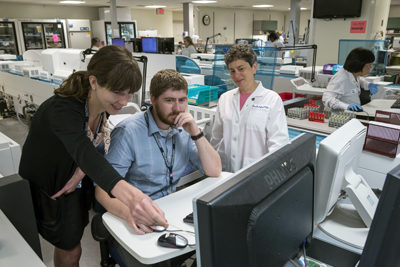
The high volume of diverse and complex pathology cases that residents manage is unique across the country. Our training model ensures that residents will gain in-depth and vast experience with not only the bread-and-butter pathological specimens, but also the extremely rare—and sometimes once-in-a-lifetime—diagnoses.
Our residents benefit from close daily interactions with our dedicated faculty and various other clinical departments, further reinforcing excellent training. A presentation describing our unique curriculum was awarded the "2020 Inspiration" award by the Association of Pathology Chairs.
Programs
Residents choose one of the following certifications: Anatomic Pathology (AP), Clinical Pathology (CP), and Neuropathology (NP). Our certified programs include three-year AP, three-year CP, four-year combined AP/CP, and four-year AP/NP.
AP/CP
Residents selecting combined AP and CP training have a fully integrated four-year program developed for their particular interest. During each year of the curriculum, AP/CP residents complete a mixture of anatomic and clinical pathology rotations. The first two years emphasize introductory rotations to major AP and CP divisions, including autopsy, surgical pathology, cytopathology, transfusion medicine/blood banking, and other AP and CP rotations to fit the resident's interests. In the final two years, the residents take advanced and elective rotations in both anatomic and clinical pathology. The last year of training provides substantial responsibility with senior rotations in anatomic and clinical pathology, and plenty of opportunities for advanced electives and research.
During the residency, there are multiple elective opportunities for training in the pathology of specific systems, including dermatopathology, neuropathology, renal pathology/electron microscopy, and immunohistochemistry. Most of our AP only residents also elect to have some research experience, which in some cases includes an additional funded year for dedicated research. Numerous endowed funds and a T32 training grant are available to support these research efforts.
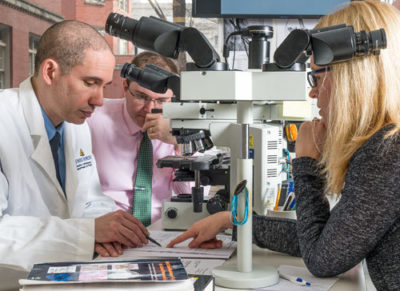
The core AP rotations include:
- Autopsy
- Cytopathology
- Forensic pathology
- Gastrointestinal/liver pathology
- Gynecologic pathology
- Molecular diagnostics
- Hematopathology
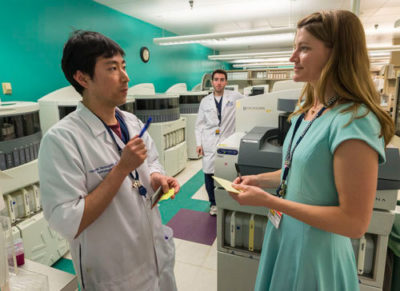
The core CP rotations include:
- Clinical chemistry
- Immunology
- Hematology/coagulation
- Management
- Medical microbiology
- Transfusion medicine
- Hematopathology
The emphasis in CP is diagnostic interpretation of laboratory tests, interaction with clinical services, and understanding of technical methods, instrumentation, information systems, quality assurance and laboratory management. Additional training consists of rotations and electives that provide further experience in select areas and opportunities for research.
Clinically relevant rotations, in both AP and CP are integrated throughout training, and residents attend and present at departmental and interdepartmental conferences. Several conferences play a major role in the Residency Training Program, including:
- Weekly didactic sessions in both Anatomic and Clinical Pathology.
- Weekly surgical pathology unknowns case conference.
- Daily and weekly multi-headed microscope and didactic conferences in surgical pathology and in specialty areas.
- Weekly work rounds and weekly seminars in clinical pathology.
- Weekly grand rounds with presentations by faculty, fellows and guest lecturers from within and outside the institution.
- Research seminars.
During your four years of residency you will complete:
| Rotation | Block(s)* |
|---|---|
| Autopsy | 4 |
| Chemistry | 2 |
| Surgical Pathology Consult Service | 3 |
| Cytopathology | 3 |
| Dermatopathology | 1 |
| Forensic Pathology | 1 |
| GI/Liver Pathology | 2 |
| Gyn Pathology | 3 |
| Hematology/Coagulation | 2 |
| Hematopathology | 3 |
| Immunology | 2 |
| Laboratory Management | 2 |
| Medical Microbiology | 3 |
| Molecular and Cytogenetics | 2 |
| Neuropathology | 1 |
| Surgical Pathology (Bayview Medical Center) | 3 |
| Surgical Pathology (JHH) | 7 |
| Transfusion Medicine | 3 |
| Total Cores AP Core-28 CP Core-19 | 47 |
| Electives/Research | 5 |
| *Each rotation block is 4 weeks in duration. |
AP Only
Residents selecting combined AP training have a fully integrated three-year program developed for their particular interest. In the first two years, all residents are exposed to the major divisions of anatomic pathology. The first year focuses on AP training, including autopsy, surgical pathology and cytopathology. In the ensuing two years, the residents take advanced and elective rotations in anatomic pathology. The final year of training provides substantial responsibility in anatomic pathology.
During the residency, there are multiple elective opportunities for training in the pathology of specific systems, including dermatopathology, molecular pathology, neuropathology, renal pathology/electron microscopy, and immunohistochemistry. Many of our AP only residents chose a more intense research experience that includes electives in research and, in some cases, a funded year for dedicated research. Numerous endowed funds and a T32 training grant are available to support these research efforts.
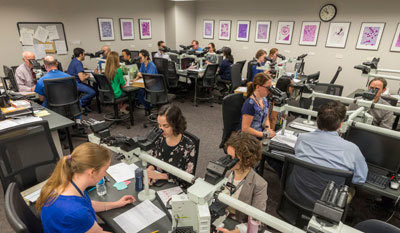
The core AP rotations include:
- Autopsy
- Cytopathology
- Forensic pathology
- Gastrointestinal/liver pathology
- Gynecological pathology
- Molecular diagnostics
- Hematopathology
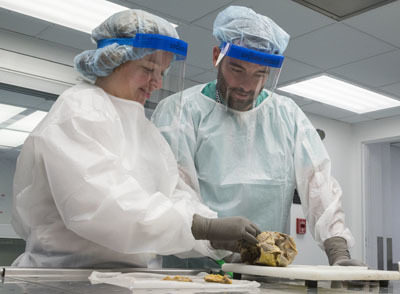
Clinically relevant rotations in AP are integrated throughout training, and residents attend and present at departmental and interdepartmental conferences. Several conferences play a major role in the Residency Training Program, including:
- Weekly didactic sessions in Anatomic Pathology.
- Weekly surgical pathology case conference.
- Daily and weekly multi-headed microscope and didactic conferences in surgical pathology and in specialty areas.
- Weekly grand rounds with presentations by faculty, fellows and guest lecturers from within and outside the institution.
- Research seminars.
During your three years of residency you will complete:
| Rotation | Block(s)* |
|---|---|
| Autopsy | 4 |
| Surgical Pathology Consult Service | 3 |
| Cytopathology | 2 |
| Dermatopathology | ‡ |
| Forensic Pathology | 1 |
| GI/Liver Pathology | 2 |
| Gyn Pathology | 3 |
| Hematopathology | 3 |
| Molecular and Cytogenetics | 1 |
| Neuropathology | ‡ |
| Surgical pathology (Bayview Medical Center) | 3 |
| Surgical pathology (JHH) | 7 |
| Total Cores | 29 |
| Electives/Research | 10 |
| * Each rotation block is 4 weeks in duration. ‡ Recommended elective |
CP Only
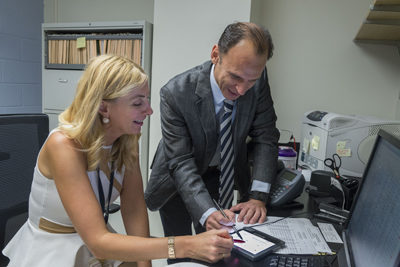
Residents selecting CP only training have a fully integrated three-year program developed based on their particular interests with assistance from their faculty mentor. In the first two years, all residents are exposed to the major divisions within Clinical Pathology, with rotations in Chemistry, Hematology/Coagulation, Medical Microbiology and Transfusion Medicine. More specialized experiences are also provided in Hematopathology, Immunology, and Molecular Pathology/Cytogenetics. In the third year, the program includes sufficient time for electives and research allowing the CP only resident an opportunity for further specialization. This final year of training provides substantial responsibility in clinical pathology with leadership in the laboratory. Many of our CP only residents chose a more intense research experience that includes electives in research and, in some cases, a funded year for dedicated research. Numerous endowed funds and a T32 training grant are available in the Department to support these research efforts.
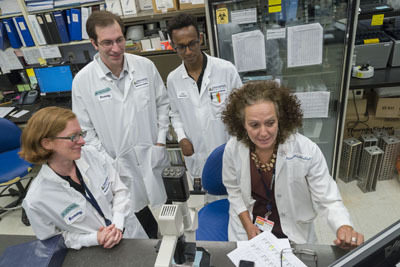
Our program provides a unique opportunity to work on an individual basis with faculty members who are leaders in their fields. With extensive rotations throughout the clinical laboratories, the overriding goals of CP training are focused in three specific areas:
- the science supporting clinical laboratory testing, including technical methodologies and instrumentation,
- the medical significance and interpretation of test results, requiring interactions with clinical services and an understanding of pathophysiology, and
- principles of laboratory management, including the role of the medical director, information systems, and quality assurance.
Clinical Pathology residents attend and present at departmental and interdepartmental conferences. Each laboratory has specific conferences providing opportunities for both didactic and active learning in a focused subspecialty area. Additionally, several departmental conferences play a major role in the Clinical Pathology Residency Training Program, including:
- Weekly didactic sessions in Clinical Pathology.
- Weekly work rounds addressing the on-call and consultative role of the clinical pathologist.
- Weekly seminars in clinical pathology.
- Weekly grand rounds with presentations by faculty, fellows and guest lecturers from within and outside the institution.
- Quarterly quality improvement forums for residents, providing additional exposure to quality assurance and quality improvement activities.
- Research seminars.
During your three years of residency you will complete:
| Rotation | Block(s)* |
|---|---|
| Chemistry | 2 |
| Hematology/Coagulation | 2 |
| Hematopathology | 3 |
| Immunology | 2 |
| Laboratory Management | 2 |
| Medical Microbiology | 3 |
| Molecular and Cytogenetics | 2 |
| Transfusion Medicine | 3 |
| Advanced specialty training as determined by faculty and resident | 6 |
| Total Cores | 25 |
| Electives/Research | 14 |
| * Each rotation block is 4 weeks in duration. |
AP/NP
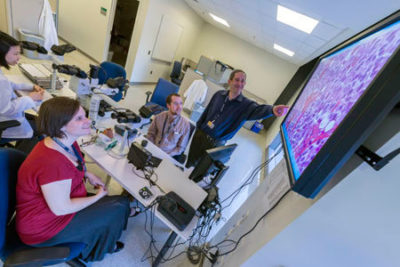
Residents selecting the AP/NP track will undergo rigorous training in anatomic pathology and neuropathology in a fully integrated four-year program developed for their particular interest and leading to AP/NP Board eligibility. The first two years encompass the core disciplines of anatomic pathology. In the second two years, residents work as neuropathology fellows and focus exclusively on neuropathology, with 21 months of rotations covering surgical, autopsy, and forensic NP as well as neuromuscular and eye pathology. The final year of training provides substantial responsibility in neuropathology, leadership opportunities and at least 3 months of elective or research time that may be tailored to the fellow's clinical and/or research interests. While research is emphasized and supported, development of the knowledge base and skill set necessary for independent work in diagnostic anatomic and neuropathology is paramount. Previous trainees have built on this foundation in successful careers involving various combinations of surgical pathology and clinical neuropathology as well as research focusing on tumor biology, mechanisms of neurodegeneration, and nervous system development.
For individuals interested in developing a career as an independent investigator, additional training opportunities are available through R25 and T32 grants.
NOTE:
Residents who are completing AP training, AP/CP training, or training in a neuro-related clinical discipline (including one year in general Anatomic Pathology) and who are interested in becoming Board-eligible in neuropathology should apply directly to the Division of Neuropathology's two-year fellowship program:
(LINKS: Neuropathology Training Opportunities, Fellowship Training Programs).
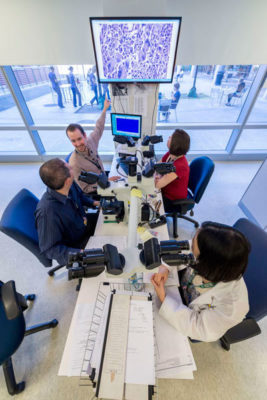
The core AP rotations include:
- Autopsy
- Cytopathology
- Forensic pathology
- Gastrointestinal/liver pathology
- Gynecological/pediatric pathology
- Hematopathology
- Surgical pathology
Clinically relevant rotations in AP are integrated throughout the first two years of training, and residents attend and present at departmental and interdepartmental conferences. Several conferences play a major role in the Residency Training Program, including:
- Weekly didactic sessions in Anatomic Pathology.
- Daily autopsy gross conference.
- Weekly surgical pathology case conference.
- Daily and weekly multi-headed microscope and didactic conferences in autopsy and surgical pathology and in specialty areas.
The core NP rotations include:
- Autopsy neuropathology
- Surgical neuropathology
- Neuromuscular laboratory (muscle and medical nerve biopsies)
- Ophthalmic Pathology
- Outside elective rotations in pediatric neuropathology
During clinically relevant rotations in NP in the 3rd and 4th year, residents attend and present at departmental and interdepartmental conferences. Several conferences play a major role in the Neuropathology Fellowship Training Program, including:
- Weekly didactic sessions in neuropathology.
- Weekly autopsy neuropathology conference.
- Weekly multi-headed microscope fellows case conference
- Weekly neuro-oncology tumor boards
- Monthly pituitary conference
- Weekly grand rounds with presentations by faculty, fellows and guest lecturers from within and outside the institution.
- Research seminars.
The first two years are dedicated to Anatomic Pathology services and you will complete:
| Rotation | Block(s)* |
|---|---|
| Autopsy | 4 |
| Surgical Pathology Consult Service | 2 |
| Cytopathology | 2 |
| Dermatopathology | ‡ |
| Forensic Pathology | 1 |
| GI/Liver Pathology | 2 |
| Gyn Pathology | 2 |
| Hematopathology | 2 |
| Molecular and Cytogenetics | 1 |
| Surgical Pathology (Bayview Medical Center) | 3 |
| Surgical Pathology (JHH) | 7 |
| Total Cores | 26 |
| * Each rotation block is 4 weeks in duration. ‡ -recommended elective |
During your second third and fourth years, you will complete:
| Neuropathology fellowship | |
|---|---|
| - Autopsy Neuropathology (including forensic neuropathology) - Eye pathology - Surgical neuropathology - Peripheral nerve and muscle - Pediatric neuropathology | Up to 21 months |
| Elective or research time | 3 months (final year) |
Specialized Expertise Tracks (Optional)
We offer unique elective specialized expertise tracks for interested residents. While working with a dedicated faculty member and completing well-defined goals and objectives, residents can gain an additional area of expertise during residency. Pathology Residency Program Special Expertise Tracks Meet the Needs of an Evolving Field
The below tracks are completely optional and are offered to interested residents:
Physician-Scientist Research
This pathway is designed to increase the number of physician-scientists in pathology by attracting exceptional and committed young physicians into the field.
Participants in this track will complete at least one year of research utilizing the institutional T32 training grant or equivalent grant. Excellent mentorship and the establishment of a personal research committee ensure trainee success in the program. Further, participants will have the opportunity to interact with students and faculty in the world-renowned medical scientist training program (MSTP) and the new Physician-Scientist Training Program at the Johns Hopkins University School of Medicine. The Department of Pathology at Hopkins has been ranked #1 in NIH funding for nine of the past ten years, and this funding provides a wealth of unique research opportunities. Research can also be supported by several departmental endowments for resident research such as the Fred and Janet Sanfilippo Research Fund.
Upon completion of the track, residents will be prepared for a career in academic medicine centered on basic science or clinical research and will be eligible for the American Board of Pathology's Physician-Scientist Pathway Certification. Of our graduating residents who went into academics, 75% became professors of pathology, 20% chairs of pathology departments, 6% deans of medical schools, 3% were elected into the National Academy of Sciences, and one was awarded a Nobel Prize.
Education
The Johns Hopkins University School of Medicine has a long and rich history of excellence in education. The goal of education track is to provide the next generation of academic pathologists with the conceptual and practical skills necessary to become master educators by taking advantage of the many opportunities available at Hopkins. Residents can participate in educational offerings in the Institute for Excellence in Education (IEE) in the School of Medicine.
As a sign of our commitment to education, the Department has established two endowments to support resident education projects: The Mabel Smith Fund for Resident Research and Education and The Risa B. Mann, M.D. Fund.
Residents will pursue initiatives related to education delivery, curriculum/educational product development, and/or education scholarship during residency. Upon completion of the track, trainees will be well-equipped with the skills necessary to be leaders in medical education.
Check out some of the innovative teaching tools that are currently coming out of our department!
Related links:
Informatics
Technology and information systems are rapidly changing medicine. The overarching goal of this track is to train leaders who can contribute to one of the many diverse areas of informatics, including: clinical informatics, bioinformatics, and imaging technologies in pathology.
During residency, participants will complete a basic curriculum, learn and/or develop a new skillset with a mentor, and will complete a project related to an area of interest in informatics. Whether participants are interested in data mining or the interworking of the laboratory information system (LIS), the opportunities at Johns Hopkins are endless.
QA/QI/Value-Based Care
The Quality Improvement pathway is designed to provide foundational knowledge of quality concepts, techniques, and tools to enable residents to observe systemic processes in day to day work and suggest action to improve local, regional, and national Pathology practice.
The track will include didactic readings plus online and in person courses including at a national meeting. Residents will participate in a hospital QI committee and serve as internal or external CAP inspectors. They will develop quality related research projects which will be eligible for publication and teach their peers about quality improvement, culminating in a capstone thesis-type experience in the fourth year.
Upon completion of the track, residents will be prepared to become future leaders in quality improvement and control in both university and private practice settings.
Related Links:
Health Policy/Hospital Management
This track is intended to teach the next generation of academic pathologists the knowledge and skills necessary to be leaders in the areas of healthcare policy and business management.
The curriculum includes designated reading materials and optional classroom activities at the Carey Business School and the Bloomberg School of Public Health. Further, residents will participate in regular Departmental Finance Committee and Departmental Leadership meetings. Finally, residents will work with administration on a business improvement project or healthcare policy initiative.
Upon completion of this track, participants should understand what is needed to operate a Pathology department or business unit and will have ideas to innovate practice as leaders in the field.
Global Health
This track is intended to provide interested residents and fellows with exposure to the challenges pertaining to pathology and laboratory medicine in low resource settings.
Despite being central to surveillance and clinical management, Pathology is grossly neglected and/or under-resourced in low-middle income countries (LMICs). This track offers a myriad of opportunities for global health outreach along the core tenets of research, education and clinical practice.
Over 3-4 years of residency, this track combines formal and informal teaching with a capstone project to impart both theoretical knowledge and practical experience in global health. The capstone project is specifically intended to transform theory into real-world experience. While travel is not required, it is strongly encouraged, at least for the fieldwork component of the project (if so applicable). There are resources available to this end that may be awarded based on the outcome of a competitive applications process.
Check out some of the interesting global health work being done in our department.
Developing into a Pathologist
Our program trains leaders in the next generation of pathologists. We provide residents with a unique and exceptional set of skills to support their development as diagnosticians, researchers, and/or educators.
As a Diagnostician
Our faculty love to teach. From day one, we provide residents with thorough and high-quality didactics, led by our world-renowned pathologists. First year residents will initially take an “Introduction to Histology” course as well as a “grossing” boot camp during the first 4 weeks of training, and a weekly organ-tailored “Introduction to Pathology” conference for their first 11 months of training. Residents also attend daily AP and CP didactics delivered by our faculty.
This education is not limited to traditional didactics; our faculty have developed iPad apps and PathCasts as additional tools for educating future pathologists!
Hands-On Experience
One of our core educational principles is hands-on experience. Residents are directly responsible for grossing, previewing, and signing-out with attendings. Specimens such as Whipple resections, laryngectomies, and cystoprostatectomies are routine, and residents become proficient in handling complex cases. Residents are actively involved in the laboratory including interfacing with and providing advice for clinicians and participating in lab quality control (QC) and management.
Residents benefit from the remarkably high volume of specimens per year, both in-house and consultation:
| Case Type | # Annually |
|---|---|
| Surgical Pathology | 90,000 |
| Cytopathology cases | 30,000 |
| Consult Cases | 30,000 |
| Autopsies | 350 |
| Clinical Laboratory tests | 8 million |
| ABO/Rh types and antibody screens | 105,000 |
| Blood components, tissues, and derivatives | 108,000 |
| Molecular Diagnostic tests | 6000+ |
Unknown Conferences
Core rotations and didactics are supplemented by a weekly SP unknowns conference and additional subspecialty slide sessions, including cytopathology, GI/Liver pathology, gynecologic pathology, and a monthly pediatric pathology session led by pediatric pathologists at The Johns Hopkins All Children’s Hospital.
Clinical Pathology Training
We believe in hands-on clinical pathology training. On our CP services, residents act as the first-call liaison with the rest of the hospital. Residents interact regularly with laboratory staff, interpret unusual lab results, perform Quality Control (QC), and participate in division leadership meetings. Additionally, most of the clinical pathology services have dedicated education coordinators who develop and administer an entire curriculum centered around that resident rotation. We even have a weekly clinical pathology conference and unknowns session!
As a Researcher
Since the founding of the institution, the Department of Pathology at Johns Hopkins has trained exceptional physicians and scientists to perform groundbreaking research. This commitment remains unwavering, and as such the research opportunities available to pathology residents at Johns Hopkins are unparalleled. The Department of Pathology enables residents to pursue a wide range of research activities, across basic science, translational, and clinical research domains.
Residents can choose to work on research projects with any of our exceptional faculty members. Residents will be exposed to the breadth of research interests within the department through our core rotations, core didactics, and the numerous research seminars available across the institution including the weekly Pathology Grand Rounds.
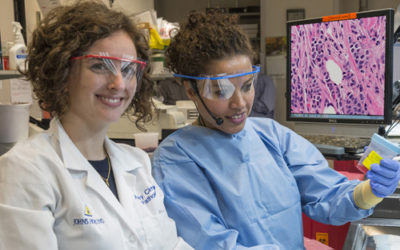
Support for Research
Support for research endeavors is available from multiple sources, including our T32 Institutional Training Grant and NIH grants. In fact, the Department has been the #1 pathology department in NIH grant funding in the world for eleven of the last twelve years! As a sign of the deep commitment the department has to supporting resident research, we have created four endowments, each valued at >$100,000, the interest from which has to support resident research projects.
Accomplishments in Research
Given the breadth and depth of opportunities available through the Johns Hopkins Department of Pathology, it is no surprise that consistently over 50% of our residents publish impactful journal articles and more than 85% present at national conferences during their residency training. Our department funds travel to one conference annually for residents who are presenting or senior authors. See our recent resident publications.
We also take part in annual departmental and hospital-wide Young Investigator Days. We celebrate our residents every year at our annual Department of Pathology Awards Presentation.
As an Educator
Intern Conference
Every year, our residents teach one or two introductory slide sessions to our interns. The sessions cover the bread-and-butter of surgical pathology. These are interactive sessions where interns can freely ask question of senior residents, and senior residents gain experience teaching at the microscope.
AP Talks, CP Talks, and Joint Pathobiology Graduate Student-Resident Conferences
There are weekly noon AP and CP conferences. At these conferences, residents present interesting AP and CP cases that pertain to their interests and/or current rotations. These talks are a wonderful way to showcase unique interests and foster resident-to-resident teaching.
Additionally, we work closely with our graduate pathobiology program and host a weekly conference where residents and pathobiology students work together to present the clinical and basic research findings in topics related to pathology.
Grand Rounds Short Topic Presentation
There are weekly noon AP and CP conferences. At these conferences, residents present interesting AP and CP cases that pertain to their interests and/or current rotations. These talks are a wonderful way to showcase unique interests and foster resident-to-resident teaching.
Additionally, we work closely with our graduate pathobiology program and host a weekly conference where residents and pathobiology students work together to present the clinical and basic research findings in topics related to pathology.
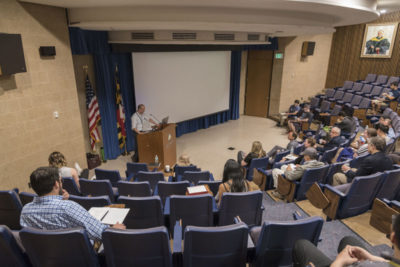
Every year, our residents are assigned to give one five-minute long presentation at Grand Rounds. The sessions can cover any material residents feel passionate about in pathology and are a great way for residents to show the entire Department their interests and knowledge! These sessions are recorded, and residents review their performance with our skilled photography and graphic arts laboratory faculty. This feedback helps us to develop our presentation skills.
Medical Student Teaching
Residents are actively involved in teaching medical students. On our rotations, we frequently have medical student rotators, and residents work closely with the medical students to teach them the basics of pathology. Additionally, residents teach the first and second year medical students in their small group sessions that review the histology and pathology of the organ systems.
Cutter Buddies
Our residents love teaching! Over the years, we gain much experience and competence grossing. When interns start rotations in which they will be grossing, they are paired with senior residents who will teach them the basics of grossing and how to gross specific specimens.
Lastly, we even have an institute dedicated to teaching teachers how to teach!
